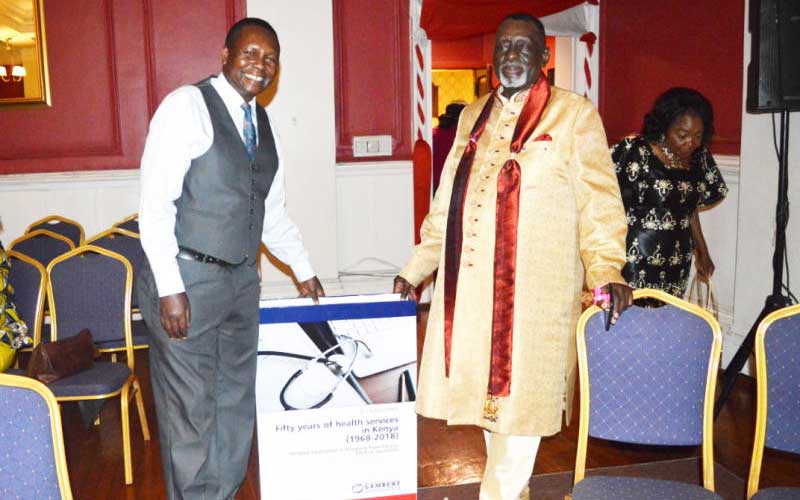
Dr Joseph Amolo Aluoch, a long serving physician and chest specialist in Nairobi and an author of two books was born at Nairobi’s Pumwani Hospital in 1943.
He grew up in Lord Dalamare Girls School compound, present day State House Girls, where the European Hospital was situated.
“We lived in the junior staff quarters, which are still standing today, as is the two-bedroom house where I spent my first few years over 70 years ago,” he wrote in his book, In the Footsteps of My Father.
His late father Wilson Aluoch, was a clinical officer, who joined Nairobi’s Native Civil Hospital, now Kenyatta National Hospital Medical Training College (MTC) in 1935. His father and mother Tabitha Owiti nyar Oketch ja K’Ogola, Gem, played a big role in his upbringing and academic journey which took him to Maseno School, Kakamega High School (1953-1962), Makere University (1963), London and Scotland in his pursuit for knowledge in medicine
He describes himself as a son of the soil from Gem Ka’ Gilo, direct lineal descendant of Kwenda, who are widely known as Nyikwa Ragem or descendants of Ragem.
When his father joined Maseno in the 1930s and passed exams, the head-teacher Carey Francis wrote a recommendation letter to Dr Manson Barr, then principal of the Medical Training Centre (MTC) in Nairobi to admit him.
After four year studies, he graduated with a medical assistants diploma, equivalent to what is now called a clinical officer certificate.
Mental shift
The book says senior Aluoch became very good, earning respect from colonial doctors because of his technical skills and other virtues and graces that would slowly but surely rub on the young man as well.
“It was while growing up that I decided long before the time arrived, that I wanted to become a doctor. My father had lit the flame,” he writes.
He married Justice Joyce Aluoch on September 11, 1971 and were blessed with three daughters Brenda, Sandra and Connie and is also a practising member of the Anglican Church, which his late parents also attended.
He writes: “Now that my kids have grown up and left the household, the rooms they occupied are empty and there is less noise in the house and everything is different. “Funny thing though, is that my routine has remained the same because I wake up early and work late at hospital.”
“The only difference though is that, whereas I often went out to drink after work, I no longer find pleasure in that kind of thing. I hardly go to the pub any more but I still treasure the time spent with friends in private members’ clubs,” he adds.
He says though his life has become quieter it remains as busy as ever, because he works late in hospital. Aluoch reads a lot and writes whenever he can and so busy with paperwork to feel lonely.
To destruct himself he used to play golf or visit the gym, though he stopped after he underwent a shoulder surgery in 2011.
When Joyce relocated to The Hague to serve as a Judge at the International Criminal Court (ICC), he got used to being a lone although when the girls visited their characteristic zest and verve for life, he had to consciously make a mental shift to accommodate the change of pace.
Joyce’s election to the ICC a few years ago, introduced a new dimension to his life that even came with a new moniker with some people calling him the Duke of Hague but it was not always been a bed of roses.
“Though I have glowed in the reflected limelight of her achievement, all the attention it has occasioned has its downside. The downside, of course is that most of the time, I’m lonely for want of her company,” he wrote in his book.
An old man’s life can be lonely and it does not help if the love of your life is 1,000 miles away. We bridged the gap by constantly keeping in touch by phone and email. Glory be to God for technology.
Why did he leave public service? “After 17 years of public service, I felt had served my turn and besides that there were other considerations. Both my wife and I had been civil servants our entire adult lives and whereas that had given us stability and respectability, the strain was starting to show.”
“Our children had grown and were attending school and the demands for money were getting out of hand. Something had to give.”
They had been debating who between Joyce and him should take the plunge and quit the public service because such a move was fraught with danger.
“Not only would one be leaving a stable job we had held all our lives but also because private practice was unchartered territory. Could a shark be lurking there in the depths? There was no way of finding out except by taking the leap.”
“With my heart in my mouth, I took a deep breath, closed my eyes and took the plunge by submitting my six-month retirement notice in June 1985 and quietly set up my practice in town.”
He says his seniors were reluctant to lose him or maybe they thought he had taken a hasty decision and continued remitting his salary for one year.
They were wrong. Even his mentor Dr Karuga Koinange (deceased) did not believe it either and he tried to dissuade him.
 The Standard Group Plc is a multi-media organization with investments in media
platforms spanning newspaper print
operations, television, radio broadcasting, digital and online services. The
Standard Group is recognized as a
leading multi-media house in Kenya with a key influence in matters of national
and international interest.
The Standard Group Plc is a multi-media organization with investments in media
platforms spanning newspaper print
operations, television, radio broadcasting, digital and online services. The
Standard Group is recognized as a
leading multi-media house in Kenya with a key influence in matters of national
and international interest.











